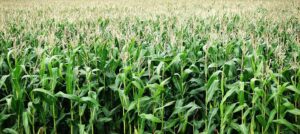

The study looked at six different types of crops proposed by the International Civil Aviation Organization (ICAO) for the production of sustainable aviation biofuels for the Carbon Offsetting and Reduction Scheme for International Aviation (CORSIA): soybeans, maize, switchgrass, miscanthus, jatropha, and reed canary grass. The authors used spatial data with global coverage from IIASA sources to calculate the direct land use change (DLUC) emissions for each of these crops.
The results showed that soybeans have the highest DLUC emissions on average, meaning they might not be the best choice to meet CORSIA emission reduction criteria. Jatropha and miscanthus had the lowest DLUC emissions, making them a more environmentally friendly option, although their performance varied depending on where they were grown. Due to the higher yields, miscanthus and switchgrass deliver the greatest production potential if cultivated in agricultural areas, replacing up to 20% of fossil kerosene consumption.
“We found that where the crops are grown is just as important as what is grown. Some areas have better conditions for producing low-carbon fuels, like having soil and climate that support high crop yields and low carbon loss. This means that choosing the right locations for growing these crops can help ensure that sustainable aviation fuels are truly sustainable.” – Neus Escobar, Guest Research Scholar at IIASA and BC3 Researcher.
The study, which has been published in the journal Science of the Total Environment, provides valuable information for policymakers and biofuel producers to make informed decisions about which crops to use and where to grow them to maximize environmental benefits.
The study was funded by the EU H2020 Project ALTERNATE: https://iiasa.ac.at/projects/alternate
Read the full press release: https://iiasa.ac.at/news/jul-2024/are-sustainable-aviation-fuels-truly-sustainable
Link to the original publication: https://doi.org/10.1016/j.scitotenv.2024.174635
Press release by Ansa Heyl, Communications Manager and Deputy Head of Communications and External Relations of the International Institute for Applied Systems Analysis (IIASA) in Austria.



